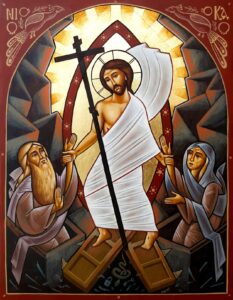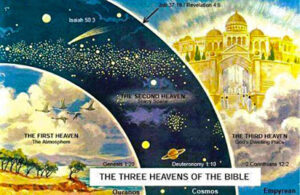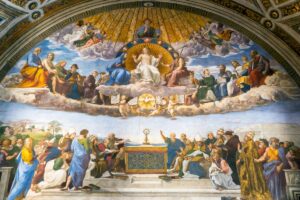Christ is risen! Truly He is risen!

Coptic Orthodox Anastasis
To those of you who schedule your entire lives around the arrival of this consistently-every-Friday Blog Post * my apologies for being a day late. This has been an extraordinarily busy week. Next week I’ll get things under control again.
- I will not use the pop abbreviation LOL here, but you know that’s what I mean!
Heaven
What is this Place like?
Long years ago I saw a cartoon of two older guys who looked like bankers or businessmen, now sitting on a cloud, dressed in white robes, holding harps, and one says to the other, “You mean this goes on forever?”
This Place where the Lord has gone, where He wants us to be: What happens there? What is it like? What can we expect?
Sometimes Heaven is defined as “the Place where God is”. Yes, but: 1 God is everywhere. There’s nowhere where God is not. 2 Heaven is God’s creation. God true dwelling place is above and beyond Heaven, “in unapproachable Light whom no man has seen or ever can see”. I Timothy 6:16 So that’s a definition which, by itself, doesn’t tell us much.
What did Christ tell us about Heaven? Quite a lot about what happens in that Place, but (and please correct me if I’ve missed something) little or nothing about the Place itself.
Here is what He said:
1 God’s will is done there. “Thy will be done on earth as it is in Heaven.”
2 Those who do the Father’s will are “rewarded” there:
“Not everyone who says to Me, ‘Lord, Lord,’ shall enter the kingdom of Heaven, but he who does the will of My Father in Heaven.” Matthew 7:21
To those who have had mercy on “the least of my brethren”, He will say: “Come, enter the Kingdom prepared for you from before the foundation of the world.” Matthew 25:31-46
To those who are suffering and enduring persecution for His sake, “Rejoice in that day and leap for joy, because great is your reward in Heaven.” Luke 6:22-23
3 Life will be secure there. “Lay up for yourselves treasures in Heaven, where neither moth nor rust destroys and where thieves do not break in and steal.” Matthew 6:20
4 “The Kingdom of Heaven is like a king who prepared a wedding banquet for his son.” Matthew 22:2
5 Implicit here (and contrary to the beliefs of some religions) is that we will retain our personal identities in Heaven.
6 In English translations, Jesus definitely describes Heaven as a Place. “In My Father’s house are many rooms. If it were not so, would I have told you that I am going there to prepare a place for you? And if I go and prepare a place for you, I will come back and take you where I am, so that you also may be with Me where I am.” John 14:2-3
Some have said Heaven is not a place, but rather a “state of being”. This made me wonder if our English Bibles might have translated the words “room” and “place” incorrectly, so I did a little research. Any Greek scholars here present – I’m not one – please correct me if this is wrong.
The Greek word used here for “place” is “τόπος / topos”, which means exactly what we mean in English: a location.
The New Testament Greek word for “rooms” is “μόναὶ / monai”, which means “dwelling places”, often now translated as “rooms”. Some early English Bibles had this as “many mansions“, which at the time meant only “dwelling places”, not “big fancy houses on five acre lots”!
So yes, Heaven is a Place. With rooms.
In fact, “many rooms”. This seems in accord with what Saint Paul described – it’s generally agreed that he was talking here about himself. “I know a man in Christ who fourteen years ago was caught up to the Third Heaven. … And I know that this man … was caught up to Paradise and heard inexpressible things, things that no one is permitted to tell.” [sometimes translated “which it is unlawful to tell”.] 2 Corinthians 12:2-4 So there’s more than one “level” of Heaven? Is Paradise the “third Heaven up”, so to speak? Out of the traditional seven? (People still speak of being in “seventh heaven”.) Or is Paradise farther up? When Christ told the penitent thief “Today you will be with Me in Paradise”, how far up did He mean?
Below: I don’t think this is it!
 I can’t discover where this picture originally came from.
I can’t discover where this picture originally came from.
So back to the original question:
What is this Place like?
All places and rooms (and mansions), as we know them, have locations, colors, shapes, dimensions, sizes, fragrances, and more.
So regarding Heaven: I think most of us (especially as we get old) wonder exactly what we’ll find there – if by the grace of God we get there. I say “if” because of the contemporary pop myth that all, when they die, automatically go to Heaven. No religion that I know teaches that.
I trust God to work out the specifics of Heaven. Really, I do. But still… I love spring here in Wisconsin. After our long bleak winter, I look out the window and take it all in, can hardly turn away – the soft blue skies, the fresh greenery and flowers, and the fragrances, and see and hear the birds as they return for the summer. *
- Well, except for today when, as I write on May 27, it is 43 degrees, and the wind is blowing hard off Lake Michigan, and it’s raining, and the birds are all huddled somewhere, complaining to themselves. I’d just as soon not take that with me!
 Simon Koopman – licensed at Wikimedia Commons
Simon Koopman – licensed at Wikimedia Commons
And I know that before long I will have to leave earthly spring behind, and many other things I love – beautiful music, trains (I’ve shared that strange fascination with my father, my son and my grandson), and much more. I don’t want to! I’m almost 83 now, and every year I wonder “Will this be my last spring?”
I know we’re supposed to practice “detachment”. But God has given us so many good gifts here. I am grateful to Him every day. And I wonder: In Heaven will there be something like spring? beautiful music? trains! Why didn’t He tell us these things?
I have so many questions. The following sounds really silly, so feel free to laugh at me. But I’ve long wondered: What language do they speak in Heaven? I mean, I really want to thank Saint Nicholas and Saint Nektarios (if I should ever make it up to where they are) for everything they’ve done for me, for us. But they spoke Greek, and my Greek is not good. (Is that why I’m suddenly studying Greek again?!) I hear you. You are now telling me: “For Heaven sake (literally), stop fussing. God will take care of it.” I know… I know…
Of all this and much more, our Lord Jesus said almost nothing. He did perhaps drop a couple of hints: In the Parable of Lazarus and the Rich Man He said there is a great gulf fixed between Heaven where Lazarus is safe “in the bosom of Abraham”, and Hell where the Rich Man is tormented in flames. Luke 16:19–31 That sounds very “spatial”, but remember this was a parable, not a geography lesson. And at His Last Supper, He said to His disciples: “You shall eat and drink with Me at My table in My Kingdom.” Luke 22:30 We were taught in New Testament class that was only figurative, but as years have gone on I’ve begun to wonder…
So there it is. So far as I can see, as to almost everything I want to know about Heaven, Jesus said nothing.
Why did He not tell us?
For two reasons, that I can think of.
1 Because it can’t be told, can’t be expressed in human language, can’t be conceived of by us, not in our present condition. Imagine someone saying to the Man Blind from Birth (the Gospel reading, Sunday after next): “Oh, look at that beautiful blue sky!” Perhaps the Blind Man could imagine light and darkness. But blue?

Public Domain, from Wikimedia
You try it: Describe”blue” in words: It can’t be done. We have to be able to see blue for ourselves.
We, in our fallen spiritual state, have lost our Heavenly vision. Once apparently we had it, but no more. Heaven cannot be described to us now, not because it is not real, but because it is “too real” for us to see – not because it is not a Place, but because it is “super-placial”. (That’s a word I just made up.) It’s too bright for us, comparable to trying to look directly into the sun. Or like ultra-violet light which exists, but our natural eyes cannot perceive it.
This is why our language about Heaven has to be expressed in metaphors – especially our language about God Himself. Moses saw “the backside of God”. Exodus 33:19-23 – but God doesn’t have a body. Jesus “sits at the Right Hand of the Father” – but the Father doesn’t have hands. (This is why it is improper to depict Him in icons as an old man.) Consider: God is not actually “He”; God is beyond male and female. He created both male and female in His Image, actually in “our image” Genesis 1 , a reference to the Holy Trinity. But I think it was Saint Basil the Great who wrote that when we speak of God as One in Three, we don’t mean “three” or “one” in a numerical sense! whatever that means, and I’m sure he didn’t either.
Christ gave us certain “safe” titles for God – “Father” and “Son”, for example – “safe” only so long as we understand that they only direct us towards an indescribable Reality which is far greater, higher, deeper than human fatherhood and sonship. Metaphors? Perhaps the better title for our words about God and Heaven is “Symbols”, in the sense of “something which points to the Reality”.
Evelyn Underhill, in her classic old book, Mysticism, told how mystics of many sorts (Christian and non-Christian) have spoken of colors they could hear, music they could see. Hesychasts have seen the Uncreated Light. But could these people describe what they saw to us who haven’t seen it? No.
So likewise, any attempt to put the lights and colors and shapes and sounds of Heaven into our words would be so utterly inadequate, that it’s better left unsaid. Saint Paul said that in the Third Heaven he heard “inexpressible things, things that are forbidden to tell.”
I think that’s why Christ never told us.
And that’s why, even though I love to use images, this section above has included no images. No point to it
Where is Heaven?
That’s even more difficult to deal with. For one thing, we need to distinguish between “Heaven” and “the heavens”, which means “the skies” – not always easy to do. This has led to the misunderstanding that Heaven is up there above the clouds, somewhere in the heavens.
Beautiful but misleading, unless it’s made clear that it is only symbolic::

from the Vatican Museum
Consider: where exactly would “up” be to us who live on a round earth, from which all directions are up? And knowing the immense distances of the cosmos, how high would we have to go to get there? Are these recent discoveries? No. The ancients knew the world is round. That’s fairly obvious to anyone who has watched a ship disappear below the horizon, then return. The Greeks said the dome of the sky is at an infinite distance from the earth. The Apostles and the Church Fathers knew this. To say Heaven is “up” has always meant “at a higher level”, just as we say students “move up” to sixth grade or wherever. Or perhaps it has meant “above infinity”, whatever that may mean.
However, Jesus did say something startling about where Heaven * is, and this also is impossible to picture. He began His ministry with the words “Repent for the Kingdom of God is at hand.” Matthew 3:2, Matthew 4:17, Mark 1:15 Heaven is here! We can reach out and touch it and experience it now. This is sometimes (also correctly) translated, “The Kingdom of God is within you” – which makes it even closer.
- In Jewish usage, still reflected in the Gospels, the word “Heaven” was used interchangeably with “God”, since “God” was considered by many too holy a word to write.
This means that if we fully repented, turned our lives around so that we were fully in union with God now, we would be in Heaven now. Which we are obviously not. But by a combination of God’s grace and our cooperation towards holiness, we can now be on the way. The Orthodox Church does not teach that Heaven is accessible to us only after we die: Bang! we’re there (or elsewhere)! Rather we can begin the journey into (not towards but into) Heaven now, if we wish.
And yet Heaven is a Place.
How to put all this together? I have no idea. Do you? There’s that old Orthodox phrase applicable in all situations: “It is a Mystery”.
Next Week and (at the rate this is going) maybe The Week After:
Three Pictures of Heaven
Contrary to everything said above (!), would it help to have some images of Heaven? so long as we’re quite clear that they are only symbols, only pointers towards the Reality.
1 The Heavenly City from The Book of the Revelation to John, a book which we Orthodox never read in church, but this portion I wish we did. This is the most important, because it is canonical Scripture.
2 C S Lewis: Heaven in The Great Divorce and The Chronicles of Narnia
3 Saint Ephraim the Syrian‘s beautiful Hymns on Paradise.